Gardening in Auburn: Cultivating Beauty and Sustainability in Your Backyard
Introduction to Gardening in Auburn
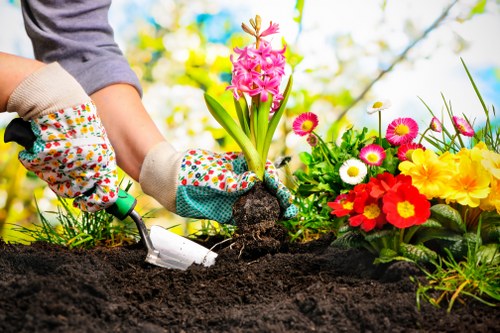
Gardening in Auburn offers a unique blend of challenges and rewards. Whether you're a seasoned gardener or just starting out, Auburn's climate and soil conditions provide a fertile ground for a wide variety of plants. From vibrant flower beds to productive vegetable gardens, the possibilities are endless.
Auburn's climate is characterized by warm summers and mild winters, which is ideal for growing both annuals and perennials. Understanding the local weather patterns is crucial for selecting the right plants and ensuring their healthy growth throughout the seasons.
One of the key aspects of successful gardening in Auburn is soil health. The region's soil typically has a good balance of nutrients, but it's essential to test and amend it as needed to support your specific plant choices. Incorporating organic matter like compost can significantly enhance soil fertility and structure.
Planning Your Auburn Garden
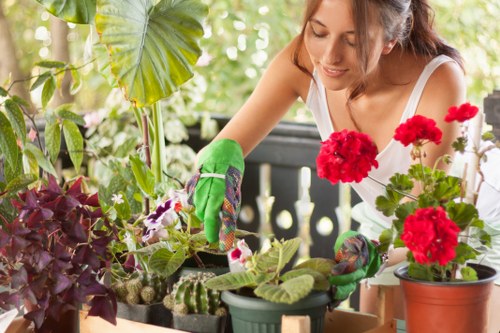
Choosing the Right Plants
Selecting plants that thrive in Auburn's environment is the first step towards a flourishing garden. Native plants are especially well-suited, as they are adapted to the local climate and soil conditions, requiring less maintenance and water.
Consider drought-resistant varieties if you're mindful of water conservation. Plants like lavender, salvia, and coneflowers are not only beautiful but also resilient during dry spells.
Don't forget to include a mix of annuals and perennials to ensure your garden remains vibrant throughout the year. Annuals provide instant color, while perennials offer long-term structure and continuity.
Soil Preparation and Maintenance
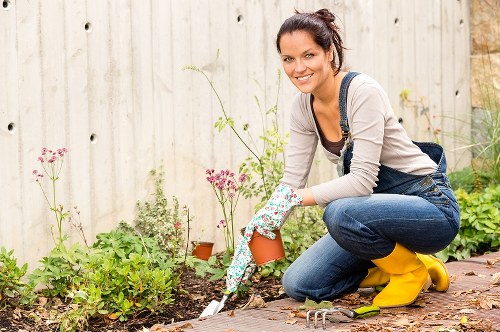
Testing and Amending Soil
Before planting, it's essential to assess your soil's pH and nutrient levels. You can purchase a soil testing kit or send samples to a local extension office for a detailed analysis. Based on the results, you can amend your soil to better suit your garden's needs.
Adding organic matter such as compost or well-rotted manure can improve soil texture, drainage, and fertility. For specific nutrient deficiencies, targeted fertilizers can help provide the necessary boost to your plants.
Regular maintenance, including mulching and weeding, is vital for keeping your garden healthy. Mulch helps retain moisture, suppress weeds, and regulate soil temperature, while consistent weeding prevents unwanted competition for nutrients.
Watering Strategies for Auburn Gardens
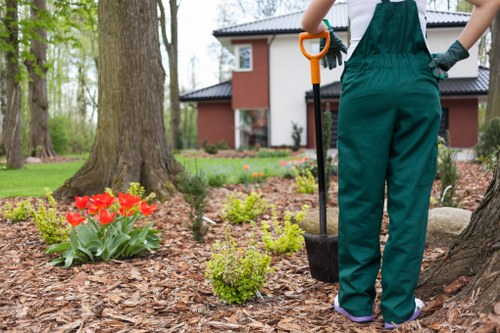
Efficient Irrigation Systems
Implementing an efficient irrigation system is key to maintaining a healthy garden in Auburn. Drip irrigation and soaker hoses are excellent choices, as they deliver water directly to the plant roots, minimizing evaporation and water waste.
Smart watering practices can significantly reduce water usage and ensure your plants receive the right amount of hydration. Watering early in the morning or late in the evening helps prevent evaporation and fungal diseases.
Rainwater harvesting is another sustainable option. Collecting and storing rainwater can provide a free and eco-friendly water source for your garden, reducing reliance on municipal water supplies.
Pest and Disease Management
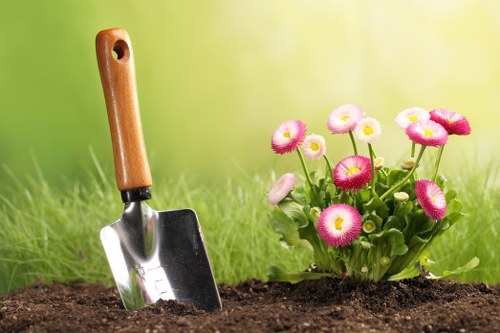
Organic Solutions
Maintaining a pest-free garden requires proactive strategies and regular monitoring. Integrated Pest Management (IPM) is a holistic approach that combines cultural, biological, and mechanical methods to control pests sustainably.
Encourage beneficial insects like ladybugs and lacewings, which prey on common garden pests. Planting a diverse range of flowers can attract these natural predators and create a balanced ecosystem.
For disease management, proper spacing and air circulation are crucial to prevent fungal infections. Removing and disposing of affected plant parts can also help control the spread of diseases.
Landscaping and Design Ideas

Creating Functional Spaces
Designing your Auburn garden involves balancing aesthetics with functionality. Incorporate elements like pathways, seating areas, and focal points to create inviting and practical outdoor spaces.
Use raised beds for better soil control and easier maintenance. They also add visual interest and can define different sections of your garden.
Edging and borders help to organize your garden layout and prevent grass encroachment. Materials like stone, brick, or metal can add a decorative touch while serving a practical purpose.
Seasonal Gardening in Auburn

Spring Planting Tips
Spring is the perfect time to start planting your Auburn garden. As the weather warms, it's ideal for sowing seeds and transplanting young plants. Focus on cool-season vegetables like peas, lettuce, and broccoli.
Preparing for summer involves selecting heat-tolerant plants and implementing shade strategies to protect delicate species from intense sunlight.
Regular watering and mulching in spring set the foundation for a productive growing season, ensuring your plants receive the necessary moisture and nutrients.
Harvesting and Garden Maintenance

Maximizing Yield
Harvesting your crops at the right time is essential for maximizing yield and flavor. Pay attention to the maturity signs of each plant, such as color changes and fruit firmness, to determine the optimal harvesting period.
Regular maintenance includes pruning, staking, and deadheading to promote healthy growth and prevent diseases. Removing spent flowers encourages plants to produce more blooms.
Implementing crop rotation and companion planting can also enhance soil health and deter pests, leading to a more sustainable and bountiful garden.
Sustainable Gardening Practices

Eco-Friendly Techniques
Adopting sustainable gardening practices not only benefits the environment but also results in a healthier and more resilient garden. Composting kitchen scraps and yard waste reduces landfill burden and provides rich nutrients for your plants.
Using native plants conserves water and supports local wildlife, creating a harmonious garden ecosystem. Additionally, reducing chemical pesticide and fertilizer use helps protect beneficial insects and pollinators.
Incorporating rain gardens and green roofs can further enhance your garden's sustainability by managing stormwater runoff and improving insulation.
Gardening Tools and Resources

Essential Equipment
Having the right tools makes gardening in Auburn more efficient and enjoyable. Invest in high-quality equipment like sturdy gloves, a reliable shovel, hand pruners, and a watering can or hose with adjustable nozzles.
Maintenance of tools is important for longevity and performance. Clean and store tools properly to prevent rust and damage, ensuring they are ready for use each gardening season.
Local gardening stores and online resources can provide additional support and advice, helping you stay informed about the best practices for Auburn's unique gardening needs.
Community and Local Gardening Initiatives

Joining Auburn's Gardening Community
Becoming part of Auburn's gardening community can provide valuable support and inspiration. Participate in local gardening clubs, workshops, and events to exchange ideas and learn new techniques.
Community gardens are excellent opportunities to collaborate with fellow gardeners, share resources, and contribute to neighborhood beautification projects.
Volunteering for local environmental initiatives can also enhance your gardening skills and foster a sense of connection to Auburn's natural landscape.
Nearby Areas to Auburn for Gardening Enthusiasts

Exploring Surrounding Regions
Gardening enthusiasts in Auburn have access to a variety of nearby areas, each offering unique features and opportunities for expanding their gardening horizons. Here are some of the closest areas:
- Fairview: Just 5 miles east of Auburn, Fairview boasts community gardens and annual plant fairs.
- Pine Hill: Located 7 miles north, Pine Hill is known for its lush green spaces and vegetable patch initiatives.
- Maple Grove: 10 miles west offers a variety of nurseries and landscaping services.
- Lakeside: 12 miles south, perfect for water gardening and aquatic plants.
- Elmwood: 8 miles northeast, featuring historical gardens and heritage plant species.
- Riverbend: 6 miles southeast, ideal for riparian planting and erosion control projects.
- Hillcrest: 9 miles northwest, offers elevated garden plots with panoramic views.
- Sunnyvale: 11 miles southwest, renowned for its sunny microclimate and flower festivals.
- Oakridge: 4 miles east, known for oak tree cultivation and woodland gardens.
- Brookside: 3 miles west, perfect for streamside gardening and wildlife-friendly plants.
- Greenville: 14 miles north, featuring extensive botanical gardens and eco-tourism.
- Cedar Park: 13 miles south, ideal for fragrant plant varieties and aromatic herb gardens.
- Stonebridge: 2 miles east, offers rock gardening and drought-tolerant plant options.
- Willow Creek: 15 miles northwest, perfect for willow trees and creekside planting.
- Autumn Ridge: 16 miles west, known for its vibrant fall colors and seasonal gardening tips.
Conclusion

Gardening in Auburn is a fulfilling endeavor that combines creativity, sustainability, and community. By understanding the local climate, preparing your soil, selecting the right plants, and adopting eco-friendly practices, you can cultivate a beautiful and productive garden.
Engaging with Auburn's vibrant gardening community and exploring nearby areas can further enhance your gardening experience, providing endless inspiration and support.
Ready to transform your outdoor space? Contact us today to start your gardening journey in Auburn and enjoy a lush, thriving garden all year round.
